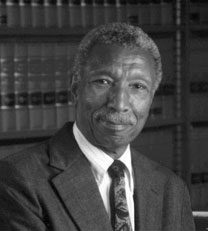- Robert L. Carter
Infobox Person
name = Robert Lee Carter

image_size =
caption = United States District Judge Robert L. Carter
birth_date = birth date and age|1917|3|11
birth_place = Careyville,Florida ,United States
death_date =
death_place =
occupation = Civil rights activist and judgeRobert L. Carter (born
March 11 ,1917 ) is a U.S.civil rights activist andjudge .Personal History and Early Life
Judge Robert Lee Carter was born on
March 11 ,1917 , inCareyville ,Florida . While still very young, his mother moved north toNewark, New Jersey , where he was raised. Judge Carter graduated from high school at sixteen and attendedLincoln University (Pennsylvania) on a scholarship and earned hisbachelor's degree inpolitical science . He attendedHoward University School of Law on a scholarship. Carter graduated from Howard University School of Law in 1940. Carter earned his LL.M. fromColumbia Law School in 1941, after writing an influential master's thesis that would later define the NAACP's legal strategy on the right to freedom of association under theFirst Amendment to theUnited States Constitution .Career as a Leading Civil Rights Advocate
".
In 1956 Carter succeeded
Thurgood Marshall as thegeneral counsel of theNAACP . Over the course of his tenure, Carter argued or co-argued and won twenty-one of twenty-two cases in theUnited States Supreme Court .Among the most important cases Judge Carter worked on after Brown was "
NAACP v. Alabama " (1958), in which the Supreme Court held that the NAACP could not be required to make its membership lists public. This removed a tool of intimidation employed by some southern states after Brown was decided, and put into practice the insights into theFirst Amendment that Carter had gleaned when still a student atColumbia Law School .In 1968, Carter resigned from the NAACP, along with his entire legal staff, in protest of the firing of NAACP employee Lewis Steele for a critical article he published in the
New York Times Magazine . In his autobiography, Carter writes that the NAACP board's decision to fire Steele over the article was aimed at him, as "an effort to exert control over the general counsel's office and bring [Carter] in line."In recognition of his civil rights achievements,
Fordham University School of Law gave Carter an honorary juris doctor degree in November 2004.Judicial career
In 1972, Carter was appointed by President
Nixon to the bench as aJudge of theU.S. District Court for theSouthern District of New York .Activism and Civic Leadership
Carter was a co-founder of the
National Conference of Black Lawyers (NCBL). He has served as a member of innumerable committees of the bar and the court, and has been associated with a very wide array of educational institutions, organizations, and foundations. He has written extensively about discrimination in the United States, particularly school segregation, and of his longtime friends and colleagues,Thurgood Marshall andCharles Hamilton Houston .Carter is a member of
Alpha Phi Alpha , the first intercollegiate Greek-letter fraternity established for African Americans.cite book | last=Wesley |first=Charles H. |authorlink=Charles H. Wesley| title=The History of Alpha Phi Alpha, A Development in College Life | edition=14th edition |origyear=1929 |publisher=Foundation | year=1981 | id=ASIN: B000ESQ14W |pages=pp. 313, 404, 467]Literary Contributions
In addition to writing numerous law review articles and essays on civil rights, Judge Carter published a well-received memoir of his struggles as a civil rights advocate.
References
Wikimedia Foundation. 2010.
